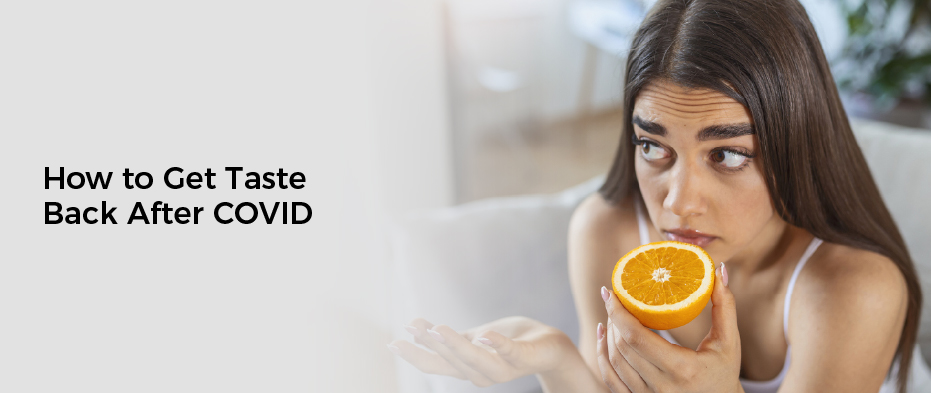If you’ve suffered from COVID, you may wonder how to get your sense of taste back. You may think about eating strong flavors to jump-start your sense of smell, but this won’t work unless you have a heightened sense of smell and taste. Instead, take a multivitamin supplement to help your body regain its sense of smell.
Parosmia
COVID-19 is a virus that can damage the nerve receptors in the nose. This can result in an altered sense of smell. Although it is usually only temporary, this problem can disrupt one’s quality of life. Fortunately, there are ways to get your sense of smell back.
Treatment options for COVID-induced parosmia include neuromodulating medications, which affect nerve cell signals. Some of these drugs can improve your sense of smell, but the effectiveness is limited. Most medications are only suitable for those with severe symptoms. Other potential treatments include stellate ganglion blockade and alpha-lipoic acid.
Most people with COVID experience some sort of loss of smell or taste. However, there are some people who manage to get back their sense of smell and taste. There are also home remedies for COVID that may help. For instance, rubbing the mouth with warm castor oil may help get rid of inflammation and restore your sense of smell.
COVID-19 is a virus that causes loss of taste and smell. While these symptoms typically subside within a few months, some people may notice that their sense of smell or taste has been altered. This is called parosmia and affects up to 25% of COVID patients.
Phantosmia
One common question after being diagnosed with COVID is how to get taste back. Although it’s not completely certain, there is evidence that it can be done. In fact, one study suggests that some people do get their sense of smell and taste back after the procedure. The research is ongoing, but it is possible to get your taste back.
COVID disrupts the olfactory nerve, which controls the sense of smell. In some people, it takes several weeks for their sense of smell to return to normal. It may also cause a change in taste, which can affect appetite and eating habits. However, only a small percentage of people experience long-term changes to their sense of taste.
Despite the temporary loss of smell, most patients recover within four weeks. However, some people continue to experience problems with taste and smell.
One viral hack suggests that eating a burnt orange mixed with brown sugar can restore taste and smell. However, doctors are unsure of its effectiveness. A more effective way to recover your sense of smell is through specialized scent training. However, the best way to do that is by consulting a medical professional.
Smell training
Smell training is a good way to get your sense of smell back. It involves repeated exposure to different smells to train your olfactory system and to establish a memory. Generally, you should start with four different scents, including fruity, rose, clove, and eucalyptus. Smells such as these require concentration and you need to breathe deeply after sniffing them.
The effectiveness of smell training depends on a variety of factors. For example, younger people can recover their sense of smell faster than older people. This is because older people tend to have fewer olfactory receptor neurons, which transmit information about smells to the central nervous system. Moreover, older people may find it difficult to stick to a smell training plan. Therefore, it is important to use a calendar to track your training sessions.
Smell training helps retrain the brain’s smell pathways, thereby increasing neuroplasticity. During the training process, you should focus on familiar smells. Try to find those that are strong enough to trigger the sense of smell. Once you start to smell them, you should be able to distinguish them from other objects.
Essential oils can also help you with smell training. Those with a limited sense of smell can place a few drops in a small jar with a lid and breathe deeply. Do this for 20 seconds and then close the jar. This method may not work for everyone, but it is safe and can improve your sense of smell.
It may take several months to fully recover your sense of smell. This means a dedicated effort on your part. However, the results may not be as good as those you experienced before the COVID infection. During this time, it is important to make sure that you follow all your doctor’s instructions.
Multivitamins
Multivitamins may be helpful for COVID-19 survivors to regain their taste and smell. The supplements are designed to give the body the nutrients it needs for recovery. You should experiment to find out what works best for you. Some people find that zinc supplementation of 50 mg per day is helpful.
A research trial in the United Kingdom is testing a vitamin A nasal drop to treat COVID-induced odour loss. The trial, which is being conducted at the University of East Anglia, will include a number of volunteer patients. The trials will use powerful odours and brain scans to test whether the vitamin A nasal drops repair damaged olfactory pathways. It is common for Covid patients to lose their sense of smell. Other viruses can also cause this condition, so the supplement may not be completely effective.
Treatment
The good news is that it is possible to get your sense of smell and taste back after a COVID infection. However, it is important to understand that the disease affects the supporting cells in the nose, not the taste buds themselves. As a result, the affected nerve cells are distorted and unable to send signals properly. The good news is that most people with COVID recover from the disease quite quickly. However, for the 5% to 10% who suffer severe loss, there may be some lingering issues.
In addition to the loss of smell, COVID can also cause a loss of taste and smell. In fact, men often experience the loss of taste and smell more intensely than women. The loss of smell and taste may also be linked to the presence of inflammation and estrogen in the body.
Fortunately, most COVID patients are able to regain their sense of smell after the infection. However, the transition period is often a very difficult one for those who lose their sense of smell. Often, patients may have a hard time recognizing what they are missing and will experience strange or even foul smells.
Although COVID survivors may be able to recover their sense of smell and taste, it will take some time to do so. Foods may taste a bit different for a few weeks after the infection. While these changes usually don’t last long, they can still affect your appetite and the amount of food you eat.


